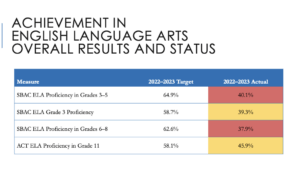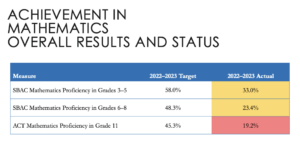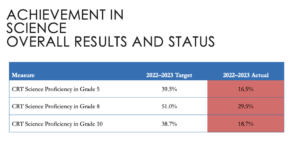
The Ed-Watch series is designed to increase access to information on what decisions
are being made regarding public education in Clark County and Nevada.
Clark County School District Board of Trustees
What is the Board of Trustees & what are they responsible for? The CCSD Trustees are publicly elected decision-makers for the school district. They are responsible for providing oversight to the Superintendent and establishing District-wide policy. Trustees are accountable to work with their communities to improve student achievement.
Click here to learn more and see a list of current Trustees
Click here to find your Trustee District
How often does the Board of Trustees meet? Trustees meet twice per month (second and fourth Thursdays) at 5 pm both virtually and at the Edward A. Greer Education Center Board Room (2832 E Flamingo Rd, Las Vegas, NV 89121).
Click here for a full list of Trustees meetings and agendas
Click here to visit Hope For Nevada’s #NVEd Calendar
Can community members engage at Trustee meetings? Decision-making bodies benefit greatly from hearing public input and multiple perspectives. Currently, members of the public can submit comments on agenda and non-agenda items through email or voice recording. Public comment can be provided in person, via email, or via voice recording. Email comments should be submitted to Boardmtgcomments@nv.ccsd.net. To submit a voice recording on items listed on the meeting agenda, call 702-799-1166. Voice recorded public comment is limited to 1 minute 30 seconds.
Thursday, October 12
Clark County School District Board of Trustees Meeting
Click here to see the meeting agenda.
Watch the meeting playback on CCSD EduVision.
What happened at this meeting?
Trustees Approved the Consent Agenda (6-1-0)
Consent Agenda Highlights:
- Approval of the grant application for teaching and training career and technical education
- Approval of a Memorandum of Agreement between CCSD and Special Olympics Nevada
- Approval of the grant application for the Early Childhood Innovative Literacy Program
- Approval of the CCSD Work-Based Learning Program Application
- Approval of the cost reimbursement sub-award agreement between CCSD and Workforce Connections for vocational training programming
- Focus: 2024 Strategic Plan Update: Reducing the Impact of Safety Concerns (explore the presentation in Spanish)
One Trustee abstained from voting on this item.
Explore consent agenda items here.
Trustees Accepted the Staff Report on 2022-23 Student Achievement (7-0)
Staff reviewed student achievement progress and results from the 2022-23 school year. The District saw a year-over-year decline, and staff identified ongoing post-pandemic learning gaps, funding levels, and delays in curriculum approval from the State as exacerbating factors.
English Language Arts Proficiency:
- In Grades 3-5, proficiency rates as measured by the Smarter Balanced Assessment Consortium (SBAC) in English Language Arts (ELA) was 40.1% for the 2022-23 school year. This is a decrease from 2018-19’s proficiency rate of 49.5%. These results also demonstrate ongoing disparities among different student groups.
- In Grade 3 ELA, District average proficiency was 39.3%, a decrease from its 46.7% proficiency rate from 2018-19.
- In Grades 6-8 ELA, District average proficiency was 37.9%, a decrease from its 47.1% proficiency rate from 2018-19.
- In Grade 11 ELA (as measured by the ACT assessment), District average proficiency was 45.9%, a decrease from its 46.2% proficiency rate from 2018-19.
- 2022-23 actual proficiency targets were not met at any grade level, as indicated by the chart below:

Mathematics Proficiency:
- In Grades 3-5, proficiency rates as measured by the Smarter Balanced Assessment Consortium (SBAC) in mathematics was 33.0% for the 2022-23 school year. This is a decrease from 2018-19’s proficiency rate of 42.2%. These results also demonstrate ongoing disparities among different student groups.
- In Grades 6-8 mathematics, District average proficiency was 23.4%, a decrease from its 31.0% proficiency rate from 2018-19.
- In Grade 11 mathematics (as measured by the ACT assessment), District average proficiency was 19.2%, a decrease from its 24.5% proficiency rate from 2018-19.
- 2022-23 actual proficiency targets were not met at any grade level, as indicated by the chart below:

Science Proficiency:
- In Grades 5, proficiency rates as measured by the Criterion-Referenced Test (CRT) in science was 16.5% for the 2022-23 school year. This is a decrease from 2018-19’s proficiency rate of 22.7%. These results also demonstrate ongoing disparities among different student groups.
- In Grades 8 science, District average proficiency was 29.5%, a decrease from its 35.3% proficiency rate from 2018-19.
- In Grade 10 mathematics, District average proficiency was 18.7%, a decrease from its 26.9% proficiency rate from 2018-19.
- 2022-23 actual proficiency targets were not met at any grade level, as indicated by the chart below:

Star Ratings:
This is the first year since the COVID-19 pandemic that star ratings have been released.
- 39% of schools rated at the three-star level or higher on the Nevada School Performance Framework.
Challenges identified include inconsistent implementation of instructional materials, delayed adoption by the Nevada Department of Education of Tier I instructional materials for ELA, educator shortages, chronic absenteeism, and the COVID-19 pandemic impacting critical years of literacy development.
Successes identified include investments in the science of reading, access to standards-based materials in math and science, facilitated professional learning, and implementation of monitoring tools.
Lessons learned identified by the District include academic recovery taking multiple years, Tier I instruction needing to be supported by the purchase of standards-based Tier I instructional materials, and such materials requiring ongoing, job-embedded coaching.
Next steps include monitoring Tier I instruction expectations and student progress, utilizing materials that customize learning pathways, and expanding schools served through the Differentiated School Support Framework based on student outcomes.
Trustees discussed timing on instructional materials by the Nevada Department of Education, timing of implementation and results, and educator and student supports.
Explore the presentation in English and the presentation in Spanish.
Public Comment
Members of the public shared comments regarding:
- Curriculum changes when a student changes schools
- Math curriculum
- Schools on block schedules and students with classrooms in portables
- Groups harassing board members, families, educators, and administrators
- Educator shortages, safety issues regarding portables, support staff salaries, and student behavior
- Educator salaries and benefits
- CCSD Policy 5138
- Board member conflicts of interest
- Providing safe spaces and supports for students
The next Meeting of the Board of Trustees is scheduled for November 9, 2023, at 5:00 p.m.
